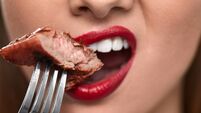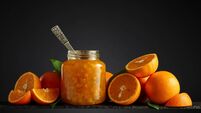Does lion's mane live up to its viral reputation as a brain health superfood?

Pharmacist Laura Dowling is a mushroom advocate. Picture: Moya Nolan
Lion's mane has long been prescribed for medicinal purposes in China, India, Korea, and Japan, but the mushroom has only recently surged in popularity here.
Wellness enthusiasts on TikTok have flooded the platform with over 58m videos extolling the myriad ways it has helped them. From enhancing cognitive function and supporting nerve health to boosting immunity and improving sleep, lion’s mane is quickly gaining a reputation as a “miracle” supplement.
Scientifically known as Hericium Erinaceus, the mushroom earned its more common moniker because its shaggy appearance resembles a lion’s mane. But does being named after the king of the jungle mean it deserves to be ranked as a superior food?
Dr Dillis Clare, a Galway-based GP and medical herbalist, believes there is some basis to the hype. Plants, and mushrooms in particular, have long been known to have health-giving properties.
“Western medicine has made drugs by identifying beneficial natural substances in plants and making synthetic drugs that replicate those substances,” she says, citing cholesterol-lowering statins and the antibiotic penicillin as two examples of drugs derived from fungi, the category of organisms that includes mushrooms.
“We know that lion’s mane has traditionally been used in eastern medicine and by the indigenous people of North America to treat a wide range of problems. It stands to reason that it could include compounds that enhance health.”

Pharmacist Laura Dowling is another mushroom advocate. “Pharmacists were originally alchemists who blended plants and herbs to make medicines,” she says. “My favourite subject in college was the medicinal use of plants, and when I went travelling in India after college, I was very taken with Ayurvedic medicine and traditional Chinese medicine and their use of mushrooms. Indian people don’t just go to the doctor when they are ill. They go to stay well and are often prescribed mushroom teas to help with that.”
During her 20 years working in community pharmacy, Dowling often recommended mushrooms to people looking for nutritional supplements.
“So many times, I’d give them such a long list of supplements to try,” she says. “Eventually I realised that what was needed was a supplement range that catered for specific wellness needs with a blend of different plant extracts, vitamins, and minerals. That way, rather than taking multiple supplements, people could take just one.”
That realisation eventually led her to establish her own range called fabÜ, which includes products that contain lion’s mane.
Dowling says there’s a lot of overblown talk about lion’s mane. “People are making outrageous claims about what it can do,” she says. “But the reason I use it in three of my products — one for menopausal and perimenopausal women, one for men over 40, and one to support mental performance — is because it’s full of beneficial nutrients like beta-glucans.”
She explains that beta-glucans, a type of soluble fibre, are naturally anti-inflammatory and antioxidant.
“Their presence in lion’s mane could be why it’s known as nature’s nutrient for the neurons,” she says.
Researchers have examined whether lion’s mane impacts brain health, and results are encouraging. A growing body of animal research, including a Chinese study conducted on mice and published in 2016, has shown that chemical compounds known as diterpenoids in mushrooms can stimulate the growth of brain cells, protect against Alzheimer’s disease, and reduce the symptoms of memory loss.

Only a few studies have been conducted on humans, but they are also promising.
In 2009, a small study of 30 adults diagnosed with mild cognitive impairment found that those given lion’s mane extract daily for 16 weeks did better in cognitive tests than those given a placebo.
A 2020 Taiwanese study had similar findings. Of 68 people in the early stages of Alzheimer’s disease, those given lion’s mane capsules for 49 weeks cognitively outperformed those given placebos.
While further research is needed, Clare argues these findings provide scientific evidence for the traditional belief that lion’s mane can support brain health.
It’s enough for her to recommend it to her patients.
“If someone in their senior years tells me they are doing things like forgetting names, I’ll tell them to take lion’s mane for its brain nourishing properties,” she says.
Clare also recommends it to people experiencing stress or low mood.
“Lion’s mane can help people who are stressed or struggling with an acute challenge like exams,” she says.
Emotional support
Research in mice shows how this might work. Studies have shown that lion’s mane’s anti-inflammatory effects could improve the functioning of the hippocampus, the brain region that processes emotional responses.
Also, a 2010 Japanese study of 30 menopausal women found that lion’s mane reduced their feelings of irritation and anxiety.
This research reinforces Dowling’s decision to use lion’s mane as a key ingredient in her perimenopause and menopause supplement.
“Women in India and China have used lion’s mane to support themselves through menopause for generations,” she says.
Western science may just be catching up with centuries-old eastern traditions.
Clare suggests that its positive impact on mood and cognition could be due to the diterpenoids it contains, particularly erinacines and hericenones, which are unique to this mushroom.
“These compounds can pass the blood-brain barrier and affect how our brain functions. They stimulate or inhibit inflammation as needed,” she says.
They influence the transmission of neurotransmitters, which are chemical messengers that pass signals from one nerve cell (neuron) to the next. “They have also been shown to nourish and protect the neurons.”
Scientists are interested in lion’s mane’s reputed neuro-nutritive and protective effects. Studies, including one published in China in 2018 are looking at whether it can help people recovering from strokes and brain and spinal injuries, as well as those living with neurological conditions like Parkinson’s.
Tempered expectations
What about the sweeping health claims circulating on social media? There’s talk of studies that lion’s mane might reduce the risk of heart disease, lower the chances of heart attack or stroke, help manage diabetes, and even fight cancer.
Dowling warns people against buying into these claims wholesale. She thinks that we should temper our expectations because most of the studies have been carried out on animals, not people.
“This is because human trials are expensive and because you can’t patent a food, it doesn’t make financial sense for drug companies to carry out trials on mushrooms. Nevertheless, there are two things we know. One is that anecdotal evidence going back centuries tells us that mushrooms can be used to support health. Two is that they should never be regarded as a substitute for medicine prescribed by a doctor.”
Clare points out that while mushrooms are generally considered safe, they don’t necessarily suit everyone.
“Mild tummy ache, queasiness, or diarrhoea will let you know if they don’t suit you. And always consult with your doctor before starting any new supplements.”
Lion’s mane isn’t the only mushroom gaining attention, though. Reishi has potential anti-cancer properties that have led to its use as a supplementary treatment for cancer in China and Japan. Studies also suggest that cordyceps have the potential to improve heart health and fight cancer, diabetes, and ageing.
No substitute for a good diet

Dietitian Sarah Keogh is sceptical of social media’s enthusiasm about mushrooms’ health properties.
“There’s a lot more talk about mushrooms than there is research behind them, particularly research that has been conducted in humans over long periods,” she says.
Despite this, she acknowledges that some research suggests benefits to lion’s mane mushrooms, for cognitive health in particular. She thinks this could be related to their high levels of B vitamins.
“Mushrooms are a nutritious food, full of fibre and minerals like potassium and selenium. They are also rich in B vitamins, which play an important role in brain function.”
However, she says there’s much more robust evidence linking other foods with brain health.
“Blueberries and cocoa, for example, contain anthocyanins that increase blood flow to the brain. Or fish oils — think of Fionn mac Cumhaill and the salmon of knowledge. We’ve always known that fish is good for our brains, and science confirms it. If I were concerned about my cognitive health, I’d focus more on eating blueberries, cocoa, and oily fish.”
Meanwhile, she is watching the emerging research into mushrooms. “In five years, we might have more solid facts about mushrooms just as we have with blueberries and cocoa now. So I’ll watch this space.
“In the meantime, I’d encourage everyone to eat mushrooms as part of a balanced diet containing a variety of fruit and veg.”
Neither Clare nor Dowling claims that mushrooms are an elixir of health.
“Much more important than eating more mushrooms is eating a healthy diet that’s rich in greens, oily fish, and fibre,” says Clare. “We should all be getting outside in the sunshine and moving our bodies. There’s a whole lot we should do for our health and cognition before we reach for the mushroom supplements.”
Dowling agrees. “Mushrooms like lion’s mane provide us with a way of augmenting our health, but our diet, sleep, and exercise patterns are still hugely important,” she says.
“It’s only when we get those right that we should look at adding in optional extras like mushroom supplements.”
Mushroom magic
Mark Cribben, a food scientist from Dublin, was introduced to the magic of mushrooms when he met his now wife, microbiologist Lucy Deegan from Glasgow.
“Lucy loves mushrooms and when she first came to Ireland in 2001, she was surprised that all Irish people ate at the time were the white cap mushrooms that you still find in most supermarkets. She was used to eating a much wider variety”, he says.
Together, they started to experiment with growing their own mushrooms and over time, this grew into a business. Ballyhoura Mushrooms was set up in 2010 and initially sold a range of mushrooms for culinary use.
However, as the public became increasingly interested in mushrooms, the range expanded to include products such as powders, extracts, and teas. “At first, we were mostly growing mushrooms for restaurants but a film called Fantastic Fungi came out on Netflix in 2019 and that changed our business dramatically,” says Cribben.
“Ever since, we’ve had a growing demand for mushroom products from people who are interested in mushrooms for health and wellbeing. And because of our professional backgrounds, we’re able to do everything from growing the mushrooms to processing them ourselves.”
The ballyhouramushrooms.ie website lists seven separate lion’s mane products, ranging from grow-your-own kits to their best-selling lion’s mane powder.
The couple often gets positive feedback from their customers about how mushrooms support their health. “We hear a lot from perimenopausal and menopausal women,” says Cribben. “They say that lion’s mane helps them deal with their symptoms.”
He believes mushrooms might have benefited his health too. “My family has a history of high cholesterol and my doctor and I often wonder if I’ve brought mine down by eating so many mushrooms.”
It’s not just us humans who enjoy lion’s mane either. “We sprinkle Lion’s Mane Plus for Senior Dogs over our dog’s food and he seems to like it.”
CONNECT WITH US TODAY
Be the first to know the latest news and updates










